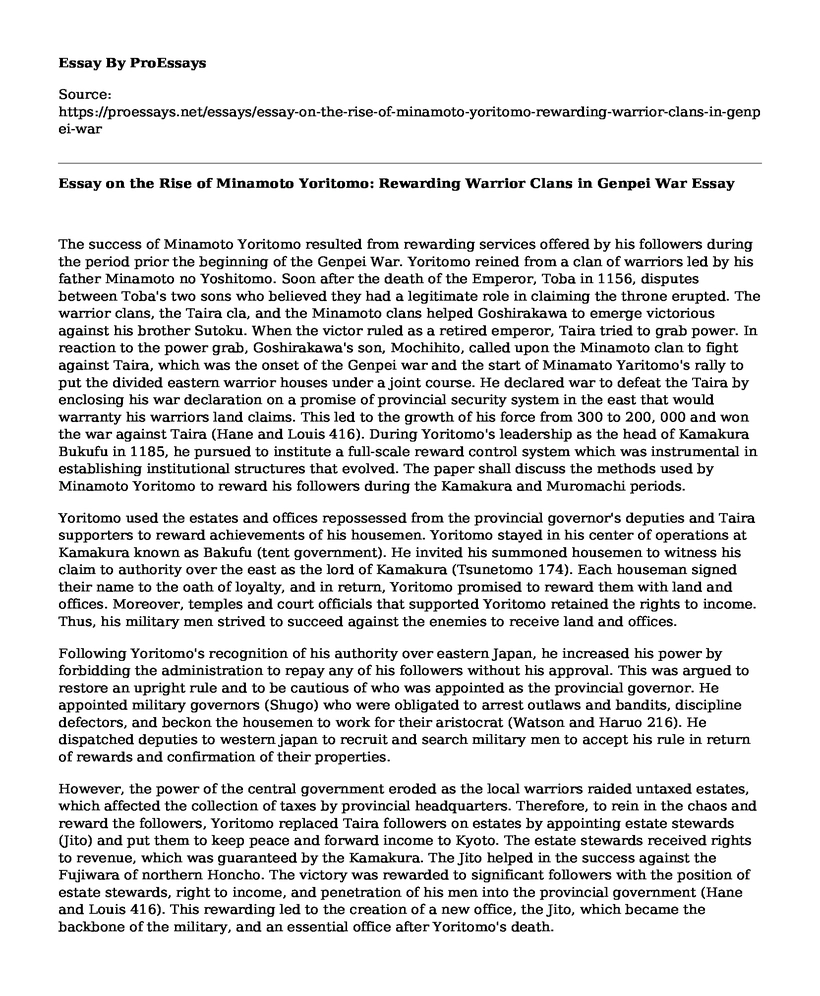The success of Minamoto Yoritomo resulted from rewarding services offered by his followers during the period prior the beginning of the Genpei War. Yoritomo reined from a clan of warriors led by his father Minamoto no Yoshitomo. Soon after the death of the Emperor, Toba in 1156, disputes between Toba's two sons who believed they had a legitimate role in claiming the throne erupted. The warrior clans, the Taira cla, and the Minamoto clans helped Goshirakawa to emerge victorious against his brother Sutoku. When the victor ruled as a retired emperor, Taira tried to grab power. In reaction to the power grab, Goshirakawa's son, Mochihito, called upon the Minamoto clan to fight against Taira, which was the onset of the Genpei war and the start of Minamato Yaritomo's rally to put the divided eastern warrior houses under a joint course. He declared war to defeat the Taira by enclosing his war declaration on a promise of provincial security system in the east that would warranty his warriors land claims. This led to the growth of his force from 300 to 200, 000 and won the war against Taira (Hane and Louis 416). During Yoritomo's leadership as the head of Kamakura Bukufu in 1185, he pursued to institute a full-scale reward control system which was instrumental in establishing institutional structures that evolved. The paper shall discuss the methods used by Minamoto Yoritomo to reward his followers during the Kamakura and Muromachi periods.
Yoritomo used the estates and offices repossessed from the provincial governor's deputies and Taira supporters to reward achievements of his housemen. Yoritomo stayed in his center of operations at Kamakura known as Bakufu (tent government). He invited his summoned housemen to witness his claim to authority over the east as the lord of Kamakura (Tsunetomo 174). Each houseman signed their name to the oath of loyalty, and in return, Yoritomo promised to reward them with land and offices. Moreover, temples and court officials that supported Yoritomo retained the rights to income. Thus, his military men strived to succeed against the enemies to receive land and offices.
Following Yoritomo's recognition of his authority over eastern Japan, he increased his power by forbidding the administration to repay any of his followers without his approval. This was argued to restore an upright rule and to be cautious of who was appointed as the provincial governor. He appointed military governors (Shugo) who were obligated to arrest outlaws and bandits, discipline defectors, and beckon the housemen to work for their aristocrat (Watson and Haruo 216). He dispatched deputies to western japan to recruit and search military men to accept his rule in return of rewards and confirmation of their properties.
However, the power of the central government eroded as the local warriors raided untaxed estates, which affected the collection of taxes by provincial headquarters. Therefore, to rein in the chaos and reward the followers, Yoritomo replaced Taira followers on estates by appointing estate stewards (Jito) and put them to keep peace and forward income to Kyoto. The estate stewards received rights to revenue, which was guaranteed by the Kamakura. The Jito helped in the success against the Fujiwara of northern Honcho. The victory was rewarded to significant followers with the position of estate stewards, right to income, and penetration of his men into the provincial government (Hane and Louis 416). This rewarding led to the creation of a new office, the Jito, which became the backbone of the military, and an essential office after Yoritomo's death.
Conclusion
In conclusion, Yoritomo used rewarding as a method of gaining followers and success against his opponents. He paid off his warriors and supporters' achievements with the claim of land and offices. Moreover, he approved rewards to Minamoto men to ensure cautiousness for people appointed as provincial headquarters and appointed military governors who arrested and punished offenders and recruited men in exchange for rewards and confirmation of their assets. Finally, he created the Jito, the estate stewards, who were entitled to an income, kept peace, and forwarded income to Kyoto.
Works Cited
Hane, Mikiso, and Louis G. Perez. Premodern Japan: A Historical Survey. Westview Press, 2015: 416. Print.Bottom of Form
Tsunetomo, Yamamoto. Hagakure: the Book of the Samurai. Boston, Shambhala Publications, 2012:174. Internet source. Accessed from: https://books.google.com/books?hl=en&lr=&id=WuIImJ1kjnMC&oi=fnd&pg=PR7&dq=hagakure&ots=Q3gKVLbXPv&sig=O7ZLucIEVcgBlk4Z8LYOneT5gQY
Watson, Burton, and Haruo Shirane. The Tales of the Heike. New York: Columbia University Press, 2006: 216. Internet resource. Accessed from: https://books.google.co.ke/books?id=74G-AwAAQBAJ&printsec=frontcover&dq=The+Tales+of+the+Heike.&hl=en&sa=X&ved=0ahUKEwirmL_2ozkAhXC8uAKHfUlCDMQ6AEIKDAA#v=onepage&q=The%20Tales%20of%20the%20Heike.&f=false
Cite this page
Essay on the Rise of Minamoto Yoritomo: Rewarding Warrior Clans in Genpei War. (2023, Feb 11). Retrieved from https://proessays.net/essays/essay-on-the-rise-of-minamoto-yoritomo-rewarding-warrior-clans-in-genpei-war
If you are the original author of this essay and no longer wish to have it published on the ProEssays website, please click below to request its removal:
- Thirteen Colonies That Form a Transcontinental Nation Essay
- The Life and Legacy of Elsa Schiaparelli - Essay Example
- Essay Example on Southern & Northern Renaissance Art: Secular & Religious Differences
- Iran-Iraq War: Territorial, Ethnic & Religious Disputes 1980-1988 - Essay Sample
- Essay Example on Native American Historical Trauma: Evidence-Based Practice Prospects
- Essay Example on Rosa Parks: Beyond the Iconic Bus Ride - Exploring Cultural Myths
- Paper Sample on The Painted Bird: An Unbearable Tale of Man's Cruelty







